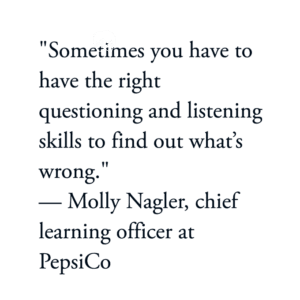Illustrations by Jonathan Bartlett.
In 2018, PepsiCo, the global food and beverage giant, was on the verge of major change. It had just named Ramon Laguarta as its new chairman and CEO, taking over for Indra Nooyi, who is credited with making PepsiCo one of the most successful food and beverage companies in the world during her 12-year tenure.
Laguarta planned to continue that transformation by driving rapid growth through a “winning with purpose” attitude. To achieve that goal, the company needed to shift its leadership culture to adopt a more long-term view of developing and reskilling the workforce, says Sergio Ezama, PepsiCo’s chief talent officer and CHRO of global functions and groups. “It was an opportunity to think differently about the future of talent development.”
That led PepsiCo to hire Molly Nagler as the company’s new chief learning officer.
 “PepsiCo has a history of hiring from within,” Ezama says. Typically the company fosters talent over many years, so that when they move high performers into leadership roles they are familiar with the company culture and ways of working. Laguarta, for example, came to the CEO role after more than two decades working his way up the ranks, and Ezama was promoted to chief talent officer after 17 years with the company.
“PepsiCo has a history of hiring from within,” Ezama says. Typically the company fosters talent over many years, so that when they move high performers into leadership roles they are familiar with the company culture and ways of working. Laguarta, for example, came to the CEO role after more than two decades working his way up the ranks, and Ezama was promoted to chief talent officer after 17 years with the company.
But Nagler was different. Not only had she never held a job at PepsiCo, she’d spent most of her career in academia.
Berkeley beginnings
After a brief stint as a copy editor, Nagler completed a two-year Master’s program in public policy analysis at the University of California, Berkeley. The program was focused on analytics and quantitative methods, which complimented Nagler’s passion for higher education. So when she was offered a position as director of academic planning at Berkeley’s Haas School of Business, it felt like a perfect fit. “It was like doing HR for faculty,” Nagler says.
She initially supported recruiting and promotion of tenured academics and helped them manage their balance of teaching and research. She then transitioned to director of strategic alliances for executive education at Haas, where she found her niche.
Nagler used her knowledge of the faculty’s expertise and interests to help executive education clients understand what value the university’s faculty could bring. “I was talking to [large, global] companies who were looking for external expertise on learning and development,” she says. Knowing which faculty excelled in which topics and who had the case studies and business perspective to inspire an executive audience helped her thrive in the role. “I was able to represent the faculty to the client and get the benefit of understanding what learning and development looks like inside of companies,” she says.
She learned about the external support structures, what learning formats and content types had the biggest impact, and how they planned and budgeted for these events. “Executive education is like consulting,” Nagler says. “You’re helping clients solve problems via education.”
The Yale years
In 2014, Nagler was offered a similar role at Yale University in Connecticut, which brought her back to the East Coast where she grew up. Yale had a smaller executive education group and was only doing customized programs at the time. But Nagler used her experience at Berkeley to expand the department’s portfolio of offerings.
“Molly is so full of energy, it uplifted the whole team,” says Tracy Sheerin, senior director of digital learning for executive education at Yale.
Nagler knew that in order to expand the program she had to first get faculty on board with teaching exec ed courses, even though she had no authority over them. She met with them individually and in groups, helping them see the opportunity in teaching executive education and the value it could bring to the university and their own careers. “Executive education is not part of the required teaching loads, so we had to get them excited about helping these companies in order to convince them to do it,” Nagler says.
Once faculty were on board, Sheerin and Nagler began actively promoting the program — and it quickly blossomed. Under Nagler’s leadership and through the strong relationships she built with faculty and staff, the department was transformed. “Molly led a huge era of expansion for executive education,” Sheerin says. During her tenure, the program doubled its revenue, built a large open enrollment portfolio of courses and launched a series of e-learning courses.
Sheerin attributes their success to Nagler’s willingness to experiment. “There are no crazy ideas with Molly,” she says. “If you have a good reason to try something, she’ll try it.”
PepsiCo comes calling
Nagler might have stayed in the world of exec ed for the rest of her career. But in 2018 she got a call from a headhunter looking for PepsiCo’s new CLO, and it was too good of an offer to resist.
With all the changes in leadership happening at the company at the time, Ezama and other decision-makers felt that a leader from outside the company — and even outside the industry — would bring a fresh perspective on how to achieve the company’s accelerated growth goals.
 The company was looking for someone who was a true learning leader, but who had the experience and charisma to translate that to a corporate environment. Nagler’s work in executive education seemed like the perfect fit, Ezama says. “She straddled both worlds.”
The company was looking for someone who was a true learning leader, but who had the experience and charisma to translate that to a corporate environment. Nagler’s work in executive education seemed like the perfect fit, Ezama says. “She straddled both worlds.”
Nagler also brought a fresh perspective to the team, says Byron Johnson, senior director of PepU, PepsiCo’s corporate university. “She wasn’t bogged down in the old ways of doing things,” he says. That made it easier for her to try new ideas and figure out what would work.
With the new long-term focus on the future, Nagler and Ezama were able to pursue projects that required a bigger up-front investment with a longer payoff, notes Ezama. In the past, leaders like Nagler faced pressure to deliver a rapid ROI, but the focus on the future gave her the space to make bigger changes, he says. That included rolling out new technology platforms and transforming the learning workflow.
Learners take the wheel
When Nagler joined PepsiCo, Johnson, who had acted as interim CLO, worked closely with her to get her acclimated to the corporate culture, and to figure out what — and who — to prioritize.
To accommodate Laguarta’s vision of accelerated transformation, the learning department knew they had to give employees greater control over their learning journey, Johnson says. That led to their first big project: launching Degreed in April 2020.
Degreed is an online learning platform that connects learning and career growth to business needs and allows users to learn and measure their skills in a single platform. PepsiCo had been planning to roll out Degreed prior to Nagler’s arrival, but she led the implementation.
Degreed addressed a number of learning goals that are part of the company’s transformation. It streamlined access to learning, empowered employees to select content that aligns with their career, and gave managers a way to curate and share content with their teams. Degreed provides access to its own content along with all of PepsiCo’s custom courses and other content libraries, which include Skillsoft and Accenture Academy.
 Tying the existing content to the new platform has elevated the entire learning offering, because it’s all front-and-center and much easier to access. “We’re getting more return on those investments and teaching our partners how to leverage what we have before we create expensive, bespoke learning assets,” Nagler says. It also reflects the more learner-empowered philosophy governing the learning culture at PepsiCo. “It is democratized learning because anyone can create learning paths, and anyone can share content.”
Tying the existing content to the new platform has elevated the entire learning offering, because it’s all front-and-center and much easier to access. “We’re getting more return on those investments and teaching our partners how to leverage what we have before we create expensive, bespoke learning assets,” Nagler says. It also reflects the more learner-empowered philosophy governing the learning culture at PepsiCo. “It is democratized learning because anyone can create learning paths, and anyone can share content.”
To ensure employees find the right content, the platform uses machine learning algorithms to suggest content based on each learner’s profile, past choices and content used by people in similar roles or career paths. “The learner experience has improved dramatically,” she says. It’s also widely embraced. The learning department’s goal was to have 25,000 active users by the end of 2020. As of July, they had reached 35,000. “Degreed has been a game-changer for the company,” Nagler says.
Learning isn’t always the answer
Nagler is also working behind the scenes to bolster the centralized learning department. PepsiCo’s corporate structure is largely decentralized, with self-contained learning teams serving autonomous business units.
This is where Nagler’s experience at Yale and Berkeley came in handy. Like the academic faculty she worked with in the past, these learning teams do not report to Nagler, which meant she had to win them over. She started by reimagining the mission. “The central question in a company that is decentralized by design is what is the added value of a corporate learning function,” she says.
While there is no single answer, Nagler landed on an overarching strategy — to offer honest guidance in solving real business problems, whether they are training-related or not. “Sometimes you have to have the right questioning and listening skills to find out what’s wrong,” she says.
Using that strategy as a jumping-off point, Nagler created a learner experience consulting team, which now fields requests for training from all of the business units and helps their learning teams find the best solutions where appropriate. While in some cases the problem involves a skill gap or behavior issue that can be addressed by training, in others the solution may require hiring new staff or implementing new technology. “Being able to think analytically and be dispassionate about what we offer prevents us from being in a situation where everything’s a hammer looking for a nail,” she says.
Virtual training in the time of COVID
These days, Nagler’s focus has shifted to meeting the needs of virtual learners during the pandemic. As with all the challenges Nagler has faced in her career, she’s treating it like a chance to innovate. “It’s been a huge upskilling opportunity for my team and for the learning partners across the company to quickly understand what makes for excellent learning experiences online,” she says.
They are also moving almost the entire portfolio of training online and launching new resources focused on teaching learning leaders how to excel in this environment. “It’s been a huge upskilling opportunity to understand what makes for excellent learning experiences online and to look at new technologies, simulations and games,” she says.
That includes adapting the company’s high-potential learning strategy for a virtual world. In the past, hi-po learning opportunities often included added perks, like travel to exotic locations or special events. But that’s no longer possible.
It’s causing Nagler to focus more on personalization as an added value. “We are taking a white glove approach to the high-potential group,” she says. Along with curating specific development plans, her team hopes to take a more active role in advising hi-pos and find opportunities to expand their experiences through things like speaking engagements and sitting on nonprofit boards. “These are things that you wouldn’t traditionally consider developmental opportunities, but why not?” Nagler says.
Looking ahead to 2021, Nagler plans to tackle the next big hurdle: learning outcomes measurement. Her team already adopted a strategy for using evaluation questions developed by researchers at IMD Business School in Switzerland. The questions are based on the elements of learning design that create the most impact from a program, she explains. Nagler’s team will be able to benchmark results against IMD’s database of outcomes and to correlate them to rates of promotion, performance scores and other relevant talent metrics. “Little by little we’ll amass this data set, and we’ll expand as we go.”
Along with providing feedback once courses are rolled out, she believes the questions will shift the learning design process. “The questions will force us to design programs in a way that caters to these elements,” she says. “It’s a very healthy disciplinary measure.”
A bright future
Nagler admits that the jump from academia to PepsiCo was disruptive, but she figured out how to transition her skills for the corporate world.
“I think the key is to lean into your fresh perspective and the credibility of your external experience, but always couch it into the context of the company that you’re in,” she says. “That way people will accept your ideas as something that’s plausible and that could work.”
Her willingness to tackle any challenge has also helped her win points, Johnson adds. “She acknowledges that we are doing a great job and then asks, ‘How can we make it even better?” he says. “That positive attitude is a breath of fresh air.”















